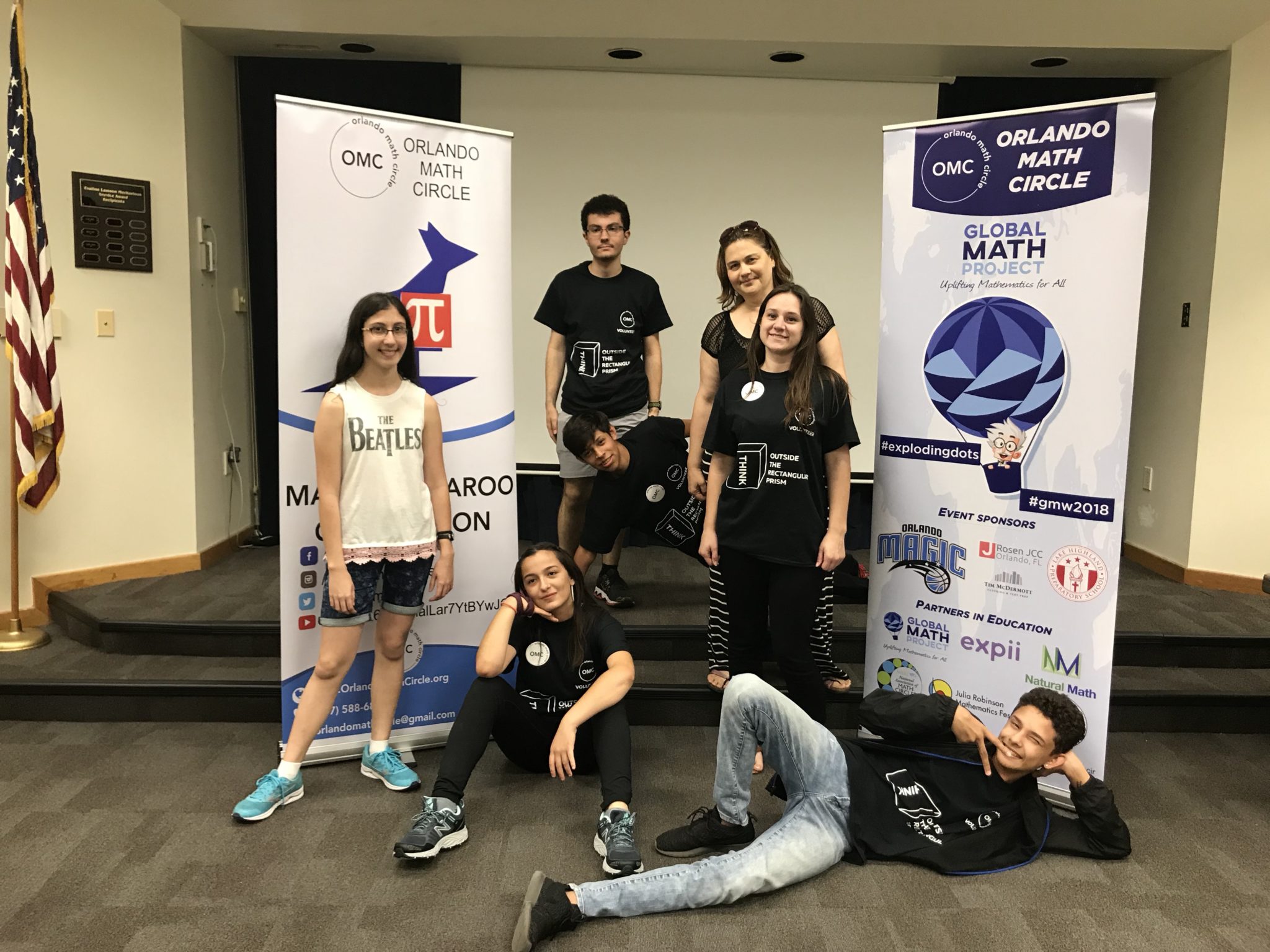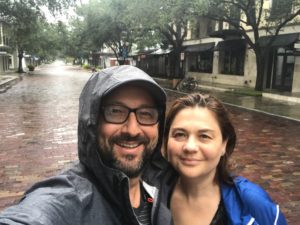
Orlando Math Circle’s Director, Margarita Azbel, has deep affection for the majesty of math, but it wasn’t always this way. Margarita was born in the Soviet Union and came to the United States as a refugee in 1980 as a youth. This global experience influenced not only her personal math journey, but her concept of math education.
Margarita’s story in her own words:
A great majority of children in the former Soviet Union play a musical instrument and do mathematics for fun. When I came to the USA at nine years old, I had only finished two grades in Belarus. Nevertheless, I was already armed with enough math sense to make it through losing a year of school during the immigration process and, a year later, I skipped a grade, eventually enrolling in a STEM magnet school. I found joy in mathematics because my grandfather and I played math games together when I was growing up. Math made me strong enough for the journey in my new country. Most importantly, I enjoyed math, I thought it was fun.
My father was an engineer who became a taxi driver and my mother was a conservatory piano teacher who became a computer programmer in the USA. It took us about 7 months to get to the US by going through Austria and Italy. When I finally started school in an ESL class, where I don’t remember learning much. I found comfort in mathematics because the meaning of numbers didn’t change, no matter what country I was in.
However, at some point in college, math became something I started to fear. I think if I’d had the experience of a math circle like Girls’ Angle, I would have had the courage to pursue a graduate degree in math or economics. Instead I decided getting a JD was a safer and more practical option for me. I didn’t know then what I know now, that everyone can acquire math skills with practice.
A Math Community
Through her experiences, Margarita recognizes community as key for developing curious kids into math enthusiasts. “Students need a community of like minded people with shared interests to grow and excel,” shares Margarita, reflecting on her childhood in a community that highly valued math, science, and the arts. As a parent, she wanted to cultivate this type of community for her sons. But even in private schools, local students rarely find a traveling math team or other opportunities to push the boundaries of standard math curriculum. Public school students were even more deprived of STEM enrichment and bound to education dictated by standardized testing.
Margarita recognized that she could help change her community’s attitude of math through the students themselves. “I realized what amazing strides students are capable of, given the right environment, when I saw my son, Ari, excel in debate. He was really bad his first year. He was not an athlete and he certainly was not like his older brother who has a gift with speech. In fact, Ari was always quiet and mostly played with Legos when he was growing up. But his private school has one of the best debate teams in the country. They have great coaches and they perpetuate great debaters by having older students work with novice debaters. In this environment, even a child who seems unlikely to excel will excel, and he did.”
Influenced by her immigrant background, Margarita made sure her boys were exposed to music, theater, ballet, art, chess and fun mathematics growing up. In their elementary school, she signed up to volunteer and lead Math Superstars, a program that was full of puzzle type questions she used to do when she was in Belarus. As the school years went on for her sons, the approach to math in their curriculum seemed to be very procedure oriented. She did not see the fun in their school mathematics, which was so different to her own childhood experience.
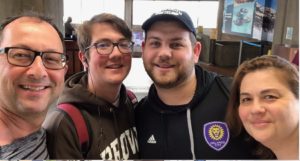
The Story of OMC
Margarita picks up her story here:
Ari discovered the fun in math in 9th grade when he was assigned to do a project of drawing of something using equations. He was completely consumed with this project. When I saw how much he was enjoying this work, I looked up to see if there were any math circles that he could go to as enrichment. There were none in our area. I told him about math circles and how they were popular in Russia. He decided to start a math circle group with a few of his friends.
That first summer in high school, Ari went to an MIT program where he studied a narrow math topic with a mentor for two weeks, at the end of which he wrote a paper. He loved the experience of studying mathematics at a much deeper level then he got to do in high school. After he did this summer program, he knew he wanted to do more mathematics outside of regular school classes. We bought MSRI Math Circles library books and he started to read them, then I picked them up as well.
Sophomore year, 2015-2016, Ari found a UCF professor who was coordinating an online math circle. He emailed him and asked him to come to his school to go over AMC questions since Ari’s original math circle was keen on competitive mathematics. The professor came to do a talk in April 2016, and Ari realized that he had no training to be successful in math competitions, so that summer he went to an intensive summer math program recommended by one of his debate friends. I was not active at OMC for the first three years, but I was always there encouraging and cheering on whatever Ari and his friends were doing. I also incorporated OMC as a nonprofit in August 2016.
The experience that changed the direction of OMC was a Math Circles on the Road meeting that I attended in NYC with Ari in October of 2016. There were so many inspiring leaders at this conference like Maria Droujkova, Brandy Wiegers, Tatiana Shubin, Dan Zaharopol and Doug O’Roark. Many of these people developed successful programs for low income, minority children in rural and urban areas. As I was watched the guest speakers, I was also watching Ari. I could tell that something clicked for him.
After this conference, he decided he wanted to change the direction of OMC from competition prep to service development. I was, of course, cheering him on. I thought this would be a wonderful direction since there was nothing in Orlando like this. Ari was able to use a contact of his friends’ parents to get OMC volunteers to do math circle activities in an STO (school of transformation office) public school. The volunteers went to Meadowbrook on a regular basis during their junior year. I was an occasional driver and the video person.
In 2017, I did find an invaluable person to OMC on an online freelance website, Ruth Estabrook. I hired Ruth to add Florida Standards to the activities that the volunteers picked to do at the public school to legitimize our content. In May of 2017, Ari received a message from Dr. Po Shen Loh, who offered to speak to our community. This was also the time when Ari and Momo, who was one of the founders, were named the debate captains of their school team. That summer was also the summer Orange County Public Schools rejected our formative evaluation and told us we were not allowed to continue coming to the school where the students were volunteering since we did not present enough data. All of these events pushed me to the forefront to help OMC survive and go on.
Math in America
As Margarita has gotten more involved in math studies in Orlando, she has taken the time to learn about why the US is coming up short in mathematics globally to guide the grassroots level work of OMC. She recognizes that a huge issue is student perception of math — many students report that is boring or that they “aren’t a math person”, as if some people simply are unequipped to learn. An additional challenge is the stark disparity of participation between student of different genders and race. An easy fix for this is to provide mentors for girls or black students to whom they can turn to with a question or for advice, to celebrate accomplishments with, and who cheer them on.
As a community, we can help change negative the perception of math by making math a part of everyday conversation from the time the kids are babies. Adults can foster this by asking questions, even if they don’t know the answer, observe the world around themselves and include children in asking, comparing, observing patterns, and searching for math. Lead young minds to compare relationships, sizes, play math games, find patterns in art and make math art connections in fun ways like tessellations and fractals.
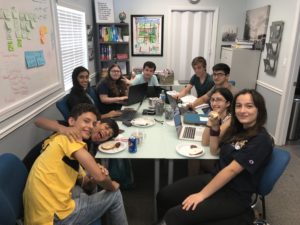
A Message to Orlando Area Parents
Students grow and learn tremendously from extracurricular activities they are interested and involved in, whether that’s music, debate, or sports. There needs to be a place of special interest for math. It is important because enrichment is key for growing minds, potential, empathy, creativity, and community. Orlando Math Circle is this community.
The better quality the community, the more growth and discoveries that will be made by students. It is amazing what an interested student can accomplish. We, as a community have a responsibility to give all interests a fertile ground, including mathematics. We also have a responsibility to give special encouragement and support to students who are underrepresented in mathematics, from classes and gifted programs to college courses and graduate study.
Margarita recommends providing students access to programs where they do engaging math activity on a regular basis, at least every week. Special events are great for garnering excitement and curiosity, but growth will happen only when students have time to work on deep problem solving skills on a regular basis. Just like for a sport, parents take kids to practice several times a week, but for some reason, parents find it hard to bring students to practice for mathematics on a regular basis. Just like training the body to be conditioned and better able to perform, parents and educators need to train children’s brains not to just perform operations, but to learn how to learn, how to ask questions, and how to work through a complex problem. Parents can incorporate math into daily life for their children. Talk about the mathematics in cooking, gardening, and design.
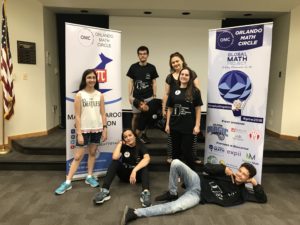
The Future of OMC
Margarita and supporters of OMC hope the future of this organization looks like Navajo Math Circles, Math Circles of Chicago, BEAM: Bridge to Enter Advanced Mathematics, Orange County Math Circle or Girls’ Angle. Each of these math circles has unique features that add to their success, and OMC aspires to have the reach that these math circles have.
Short-term, the goal is for OMC to create a community that has a physical location. Margarita hopes to create a pipeline of students, where young students participate in our programs and high school and college students teach. Currently, the older students are doing an internship where they have organized a mathematical scavenger hunt for younger students.
Another hope is that OMC can hire and pay students who have shown interest and commitment because, if we want to change statistics of people involved in mathematics, we need to not just ask for volunteers, but be able to pay students who cannot afford to volunteer. Volunteering is a luxury.
Margarita attributes her passion for making math accessible to all to her immigrant background and she’s inspired by the students of Orlando Math Circle who work hard and organize themselves to make OMC a sustainable organization. For her, it’s the students who are driving the future of OMC, and she can’t wait to see where it will go!
